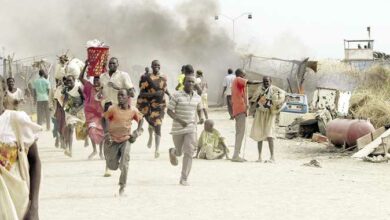
Forces from an alliance of Arab states fought their way to the outskirts of the airport in Yemen’s main port city on Friday, as the Eid holiday saw a battle the United Nations fears could trigger a famine imperiling millions of lives.
Residents in the city of Hodeidah, controlled by the Iran-aligned Houthi movement, said clashes were taking place in the Manzar neighborhood, which abuts the wall surrounding the airport. Many Manzar residents fled to the city center.
“There have been terrifying bombing runs since the morning, when they struck Houthi positions near the airport,” said Ammar Ahmed, a fish vendor. “We live days of terror that we have never known before.”
Streets were empty despite the Eid holiday marking the end of the Ramadan fast. Residents instead hunkered at home as battles raged on the outskirts of the city and coalition warplanes pounded coastal areas to the southeast.
The coalition of Arab states has battled with little success for three years to defeat the Houthis, who control the capital Sanaa, the main port at Hodeidah and most of Yemen’s populated areas. The assault on Hodeidah is the alliance’s first attempt to capture such a well-defended major city.
Coalition forces led by Emirati troops have advanced to within “meters” of the airport, Saudi-owned Al Arabiya television quoted Yemeni anti-Houthi military officials as saying. Warplanes also struck the main road linking Hodeidah to Sanaa to block Houthi reinforcements.
The assault is a dramatic gamble by the Arab states, who insist that they can swiftly capture the port without a major disruption to aid supplies to a country already experiencing the world’s most pressing humanitarian crisis.
The United Nations, which struggled but failed to find a diplomatic path to head off the assault, fears it will cut off the only lifeline for most Yemenis, 22 million of whom depend on aid, 8.4 million at immediate risk of starvation.
Western countries have long given the Arab states tacit diplomatic backing and sell them billions of dollars a year in arms. But that support could falter if the assault provokes the feared humanitarian catastrophe.
RESPECT THE LAW
“I urge all parties to the conflict to meet their obligations to protect civilians and civilian infrastructure and take active steps to respect international humanitarian law,” David Beasleye, executive director of the UN World Food Programme, said in a statement.
Capturing Hodeidah would give the Arab coalition the upper hand in the war, in which it has fought since 2015 to restore an exiled government driven out by the Houthis. But a successful operation would require swiftly capturing a city of 600,000 people, without inflicting damage that would destroy the port.
Civilians are fleeing if they have anywhere to go, or staying and bracing for a battle.
“My family left for Sanaa yesterday but I stayed behind alone to protect our home from looters,” said Mohammed Abdullah, an employee of the Houthi administration.
Riyadh and Abu Dhabi say the Houthis are a proxy force for Iran, their regional arch-rival. The Houthis, from a Shi’ite minority that ruled a thousand-year Yemeni kingdom until 1962, deny being Tehran’s pawns and say they took power in a popular revolt and are defending Yemen from invasion by its neighbors.
Houthi leader Abdel-Malek al-Houthi called on his followers late on Thursday to head to the frontlines to fight the “instruments of the United States and Israel”.
“The Yemeni coast has been a strategic target for the invaders throughout history and confronting the aggression is a national duty in the face of the danger of foreign occupation.”
The United States rejected a request from the UAE for intelligence, mine-sweeping and air reconnaissance assets for the Hodeidah operation, a UAE official said, speaking on condition of anonymity. However, the official said France had agreed to provide mine-sweeping support. The UAE has said the Houthis could plant land and sea mines at the port.




